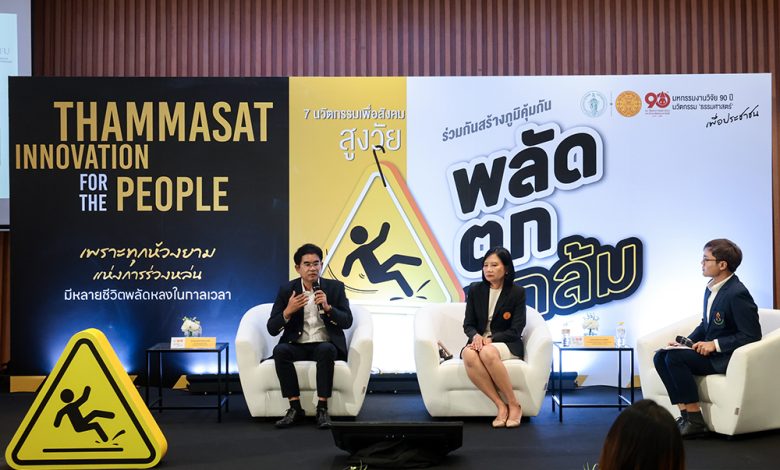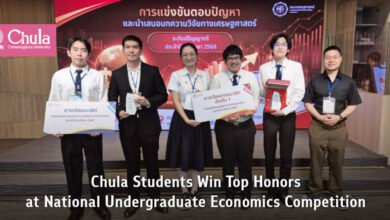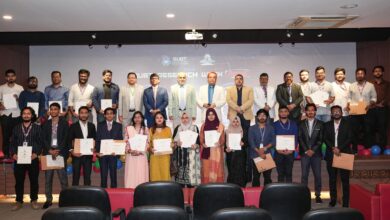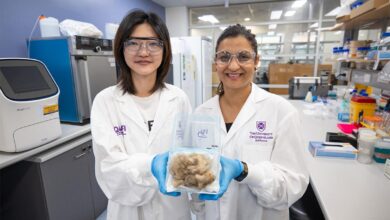Thammasat: Fundamental Research Key to Superior Tech

Thammasat University, in collaboration with Bangkok Metropolitan Administration (BMA), organized a forum on the topic “Thammasat and Research for the People” within the “90th Anniversary Research Festival” which operates under the theme “Together to Build Resilience Against Falls.” The event took place at the Bangkok Art and Culture Centre (BACC), featuring two researchers from Thammasat University as leading national researchers presenting their research findings and providing insights into the situation and limitations of research in Thailand.
Professor Dr. Phadungsak Rattanadecho, Faculty of Engineering, Thammasat University, who conducted research on World Class Frontline Research Program in Medical Engineering and Hub of Talents in Electromagnetic Energy Utilization in Medical Engineering, revealed that both research projects are in the field of medical engineering and represent in-depth fundamental research aimed at practical applications. They focus on a new method of cancer treatment using electromagnetic waves to directly eliminate cancerous tissues, ensuring patient safety without the adverse effects associated with chemotherapy. It is evident that these technologies and innovations are fundamentally rooted in research that has undergone rigorous testing and has been continuously refined over several years. He further stated that throughout the past period, he has attempted to present that the direction of support for research should place greater emphasis on fundamental research. However, from the budget of the Science, Research and Innovation Promotion Fund (SRIP), it was found that nearly 80% is dedicated to creating innovations through strategic funding (SF), while neglecting support for fundamental funding (FF), even though all innovations are fundamentally based on foundational research.
Professor Dr. Phadungsak highlights the disparity in research funding models between Thailand and other countries. While foreign governments prioritize funding fundamental research in academia, Thailand places the burden of all research stages, from basic research to market-ready innovation, on university professors. He points out a failed policy goal of 70% private sector contribution to research funding, emphasizing that fundamental research is the essential foundation for developing advanced technology and requires collaborative support. He added that another issue with the research funding system in Thailand is what is referred to as ‘Single Year’ research. It is unrealistic to expect excellent results from a one-year research project. Conducting cutting-edge research in just one year and expecting to achieve all the outputs, outcomes, and impacts is no longer feasible. Personally, he believes that addressing these challenges requires the drive of policymakers, such as the Minister of Higher Education, Science, Research and Innovation, the Minister of Industry, the Minister of Agriculture and Cooperatives, among others, who must collaborate to create a mechanism for the integration and support of research activities.
Professor Dr. Kesara Na-Bangchang, a faculty member at the Chulabhorn International College of Medicine, Thammasat University, and a distinguished national researcher in 2021 in the field of chemical and pharmaceutical sciences, who plays a significant role in “combating drug-resistant malaria” and “developing bile duct cancer drugs,” highlights the importance of fundamental research in developing new drugs for drug-resistant malaria and bile duct cancer. However, she emphasizes the significant bureaucratic hurdles faced by medical researchers in Thailand, including lengthy delays in patent applications and ethical approvals, which hinder innovation and slow down the development of potentially life-saving treatments.
“As medical researchers, we feel that before our students can begin their research, they must go through approvals from the Ethics Committee for Human Research (EC), laboratory committee, animal committee, and human committee. While we understand that these are standards, based on our extensive research experience, we often find ourselves having to argue that the reasons provided are not valid. This results in wasted time, and in some cases, it can take nearly two years to obtain the necessary approvals. We need to find ways to address these issues to ensure they are more reasonable and appropriate,” Prof. Dr. Kesara remarked.




